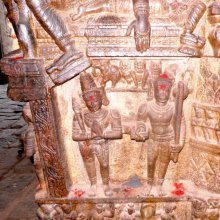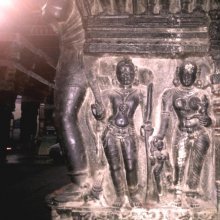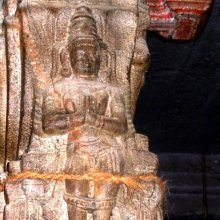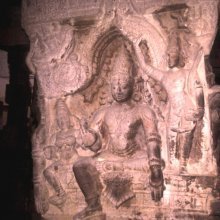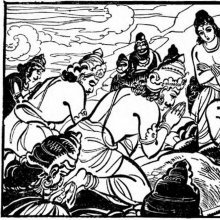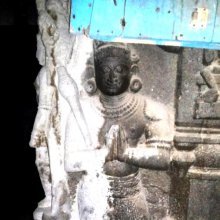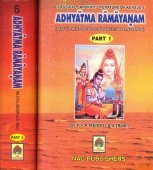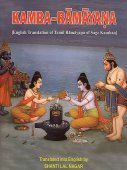Vibhishana, Vibhīṣaṇa, Vibhīṣaṇā: 28 definitions
Introduction:
Vibhishana means something in Buddhism, Pali, Hinduism, Sanskrit, Jainism, Prakrit, the history of ancient India, Hindi. If you want to know the exact meaning, history, etymology or English translation of this term then check out the descriptions on this page. Add your comment or reference to a book if you want to contribute to this summary article.
The Sanskrit terms Vibhīṣaṇa and Vibhīṣaṇā can be transliterated into English as Vibhisana or Vibhishana, using the IAST transliteration scheme (?).
Alternative spellings of this word include Vibhishan.
Images (photo gallery)
(+6 more images available)
In Hinduism
Vaishnavism (Vaishava dharma)
Source: ISKCON Press: GlossaryVibhīṣaṇa (विभीषण).—A grandson of Pulastya Muni and the pious brother of Rāvaṇa. He was a staunch devotee of Lord Rāma, who offered him the kingdom of Śrī Lankā for four yugas. He is one of eight personalities who lives for more than one cycle of four yugas.

Vaishnava (वैष्णव, vaiṣṇava) or vaishnavism (vaiṣṇavism) represents a tradition of Hinduism worshipping Vishnu as the supreme Lord. Similar to the Shaktism and Shaivism traditions, Vaishnavism also developed as an individual movement, famous for its exposition of the dashavatara (‘ten avatars of Vishnu’).
Purana and Itihasa (epic history)
Source: archive.org: Puranic Encyclopedia1) Vibhīṣaṇa (विभीषण).—Brother of Rāvaṇa. The son Viśravas was born to Prajāpati Pulastya. Rāvaṇa, Kumbhakarṇa and Vibhīṣaṇa were born to Viśravas by his wife Mālinī. A daughter named Śūrpaṇakhā also was born to them. Kumbhakarṇa and Vibhīṣaṇa went to do penance under the leadership of their eldest brother Rāvaṇa. They did severe penance and obtained various boons. The boon given to Vibhīṣaṇa was to live as a righteous man. After that they came back and defeated Kubera, the ruler of Laṅkā and brought Laṅkā under their control. Rāvaṇa became the ruler of Laṅkā. Kumbhakarṇa and Vibhīṣaṇa lived with their brother in Laṅkā. Rāvaṇa married Mandodarī. Kumbhakarṇa took Vajrajvālā the daughter of Mahābali and Vibhīṣaṇa took Saralā, the daughter of Śailūṣa a Gandharva as their wives, according to Uttara Rāmāyaṇa. Rāvaṇa conquered the three worlds and was ruling as the emperor of the whole world, when Śrī Rāma and Lakṣmaṇa went to the forest, with Sītā. Rāvaṇa carried Sītā away to Laṅkā. Rāma and Lakṣmaṇa, with the help of the monkey-army entered Laṅkā. At this time Rāvaṇa called together his ministers to consider the details about the battle with Śrī Rāma. Every one present except Vibhīṣaṇa voted for the battle. Vibhīṣaṇa advised Rāvaṇa to return Śītā, the stolen property and beg Śrī Rāma for pardon. Rāvaṇa got angry and expelled Vibhīṣaṇa from Laṅkā. Vibhīṣaṇa joined the side of Śrī Rāma and informed him of all the military secrets of Rāvaṇa. In the battle which ensued Rāvaṇa was killed and Vibhīṣaṇa was made the king of Laṅkā by Śrī Rāma. It is stated in Kambarāmāyaṇa, Yuddha Kāṇḍa that according to the instruction of Śrī Rāma and at the instance of Indra, Viśvakarmā came to Laṅkā and renovated the city of Laṅkā. (See full article at Story of Vibhīṣaṇa from the Puranic encyclopaedia by Vettam Mani)
2) Vibhīṣaṇa (विभीषण).—Mention is made in Mahābhārata, as given below, about another Vibhīṣaṇa who had ruled over Laṅkā.
2) Once Ghaṭotkaca went to the palace of Vibhīṣaṇa as the messenger of Sugrīva. Vibhīṣaṇa who heard from Ghṭotkaca about Yudhiṣṭhira honoured the messenger greatly and gave him a large quantity of valuable presents.
3) Vibhīṣaṇā (विभीषणा).—An attendant of Subrahmaṇya. (Mahābhārata Śalya Parva, Chapter 46, Stanza 22).
Source: archive.org: Shiva Purana - English TranslationVibhīṣaṇa (विभीषण) refers to “one who is definitely awful” and is used to describe Śiva, according to the Śivapurāṇa 2.3.27 (“Description of the fraudulent words of the Brahmacārin”).—Accordingly, as Śiva (in guise of a Brahmacārin) said to Pārvatī: “[...] I know Śiva through and through with all His weighty attributes. I shall tell you the truth. Listen with attention. [...] He holds the skull. Serpents twine round His limbs. Poison has left a mark on his neck. He eats even forbidden stuffs. He has odd eyes and is definitely awful [i.e., vibhīṣaṇa]. His birth and pedigree cannot be traced. He is devoid of the enjoyment of a householder. He has ten arms. He is mostly naked and is ever accompanied by ghosts and goblins. [...]”.
Source: Cologne Digital Sanskrit Dictionaries: The Purana Index1a) Vibhīṣaṇa (विभीषण).—One of Bhaṇḍa's eight councillors.*
- * Brahmāṇḍa-purāṇa IV. 12. 12.
1b) A son of Viśravas and Kaikaśī, and a friend of Rāma. On the advice of Rāma, performed funeral rites to his kith and kin, according to established conventions. Was made king of Lankā by Rāma. Held the cāmara when Bharata carried pādukā of Rāma;1 knew the yoga power of Hari and attained salvation by satsaṅga; of superior bhakti;2 a brother of Rāvaṇa;3 was present at Rāma's abhiṣeka.4
- 1) Bhāgavata-purāṇa IV. 1. 37; IX. 10. 16, 29 and 43.
- 2) Ib. II. 7. 45; XI. 12. 5; Brahmāṇḍa-purāṇa III. 34. 39.
- 3) Ib. III. 8. 47.
- 4) Viṣṇu-purāṇa IV. 4. 99.
Vibhīṣaṇā (विभीषणा) refers to the name of a Lady mentioned in the Mahābhārata (cf. IX.45.22). Note: The Mahābhārata (mentioning Vibhīṣaṇā) is a Sanskrit epic poem consisting of 100,000 ślokas (metrical verses) and is over 2000 years old.
Source: Shodhganga: The saurapurana - a critical studyVibhīṣaṇa (विभीषण) is one of the sons of Kaikasī and Viśravas, according to one account of Vaṃśa (‘genealogical description’) of the 10th century Saurapurāṇa: one of the various Upapurāṇas depicting Śaivism.—Accordingly, [...] Viśravas was born to [Ilavilā and Pulastya]. Viśravas had four wives—Puṣpotkaṭā, Vākā, Kaikasī and Devavarṇinī. From Kaikasī were born Rāvaṇa, Kumbhakarṇa, Vibhīṣaṇa and Śūrpaṇakhā.

The Purana (पुराण, purāṇas) refers to Sanskrit literature preserving ancient India’s vast cultural history, including historical legends, religious ceremonies, various arts and sciences. The eighteen mahapuranas total over 400,000 shlokas (metrical couplets) and date to at least several centuries BCE.
Kavya (poetry)
Source: Wisdom Library: Kathāsaritsāgara1) Vibhīṣaṇa (विभीषण) is the name of a king of Laṅkā, a country most difficult to reach, according to the Kathāsaritsāgara, chapter 12. King Vibhīṣaṇa was visited by Lohajaṅgha, a Brāhman whose story is told in the “story of Rūpiṇikā”.
2) Vibhīṣaṇa (विभीषण) is a king of the Rākṣasas having for his wife Mandodarī: the daughter of the Asura Maya according to the Kathāsaritsāgara, chapter 45. Accordingly, “... when his sons were thus triumphant, Maya called to mind his daughter Mandodarī, and Vibhīṣaṇa, and when called to mind, they came”.
The story of Vibhīṣaṇa and Maya was narrated by the Vidyādhara king Vajraprabha to prince Naravāhanadatta in order to relate how “Sūryaprabha, being a man, obtain of old time the sovereignty over the Vidyādharas”.
3) Vibhīṣaṇa (विभीषण) was given sovereignty of Laṅkā by Rāma, according to in the Kathāsaritsāgara, chapter 51. Accordingly, “... then Rāma, in his bereaved state, made Sugrīva his friend by killing Bālin, and by sending Hanumān to Laṅkā obtained news of his wife. And he crossed the sea by building a bridge over it, and slew Rāvaṇa, and gave the sovereignty of Laṅkā to Vibhīṣaṇa, and recovered Sītā.”.
The story of Vibhīṣaṇa was narrated by the Vidyādharī Kāñcanaprabhā to Naravāhanadatta while in a Svayambhū temple of Śiva, in order to demonstrate that “people who possess firmness endure for a long time mutual separation to which no termination is assigned”, in other words, that “heroic souls endure separation for so long a time”.
The Kathāsaritsāgara (‘ocean of streams of story’), mentioning Vibhīṣaṇa, is a famous Sanskrit epic story revolving around prince Naravāhanadatta and his quest to become the emperor of the vidyādharas (celestial beings). The work is said to have been an adaptation of Guṇāḍhya’s Bṛhatkathā consisting of 100,000 verses, which in turn is part of a larger work containing 700,000 verses.
Source: Wisdomlib Libary: KathāVibhīṣaṇa (विभीषण) was a king of Laṅkā, according to the fifth Ucchvāsa of the Udayasundarīkathā. The son of his maternal uncle was Māyābala, who later came to challenge Malayavāhana (king of Pratiṣṭhāna).
The Udayasundarīkathā is a Sanskrit epic tale written by Soḍḍhala in the early 11th century, revolving around the Nāga princess Udayasundarī and Malayavāhana (king of Pratiṣṭhāna).

Kavya (काव्य, kavya) refers to Sanskrit poetry, a popular ancient Indian tradition of literature. There have been many Sanskrit poets over the ages, hailing from ancient India and beyond. This topic includes mahakavya, or ‘epic poetry’ and natya, or ‘dramatic poetry’.
Vedanta (school of philosophy)
Source: Shodhganga: Siva Gita A Critical StudyVibhīṣaṇa (विभीषण) or Vibhīṣaṇagītā refers to one of the sixty-four Gītās commonly referred to in Hindu scriptures.—Gītā is the name given to certain sacred writings in verse (often in the form of a dialogue) which are devoted to the exposition of particular religious and theosophical doctrines. Most of these Gītās [i.e., Vibhīṣaṇa-gītā] originate from the Mahābhārata or the various Purāṇas.

Vedanta (वेदान्त, vedānta) refers to a school of orthodox Hindu philosophy (astika), drawing its subject-matter from the Upanishads. There are a number of sub-schools of Vedanta, however all of them expound on the basic teaching of the ultimate reality (brahman) and liberation (moksha) of the individual soul (atman).
General definition (in Hinduism)
Source: Wisdom Library: HinduismVibhīṣaṇa (विभीषण, “terrific”):—In Vedic hinduism, he is one of the half-brothers of Kubera but later became the ally of Rāma. Kubera was the Vedic God of wealth presiding over all earthly treasures.
Source: Apam Napat: Indian MythologyVibhishana was the younger brother of Ravana, the king of Lanka. Kumbhakarna was his other brother. Shurpanakha is their only sister. A Brahmana sage named Vishrava was the father of these four Asuras and their mother was a Asura woman by the name of Kaikasi. Vishrava is the father of Kubera, but by a previous marriage.
Vibhishana was known for his rectitude and his unswerving determination to tread the path of virtue. He vigorously opposed Ravana's kidnapping of Sita. When he could not convince his elder brother, Vibhishana left Lanka and joined the army of Rama. He played a major role in the victory of Rama, assisting him in countering the magical warfare employed by the Rakshasas.
Source: WikiPedia: Hinduism1) Vibhishana was a king who ruled what is part of Sri Lanka today and is also written off in the historical epic Ramayana. He was the younger half brother of the Rakshasa (demon) king Ravana of Lanka. Though a Rakshasa himself, Vibhishana was of a noble character and advised Ravana, who kidnapped and abducted Sita, to return her to her husband Rama in an orderly fashion and promptly. When his brother did not listen to his advice, Vibhishana joined Rama's army. Later, when Rama defeated Ravana, Rama crowned Vibhishana as the king of Lanka.
2) Vibhīshaṇa (विभीषण): Vibhishana was a rakshasa, brother of Ravana. He was of a noble character and advised Ravana, who kidnapped and abducted Sita, to return her to Rama.
etymology: Vibhishana (Sanskrit: विभीषण, IAST: Vibhīṣaṇa; Javanese: Wibisana; Khmer: Bibhek; Lao: Phibphi; Tamil: விபீஷணன்; Malay: Bibusanam; Thai: พิเภก Phipek; Sinhala:විභීෂණ; Yuan: Bikbi) or Bibhishan
In Buddhism
Tibetan Buddhism (Vajrayana or tantric Buddhism)
Source: Wisdom Library: Tibetan BuddhismVibhīṣaṇa (विभीषण) is the name of a Rākṣasa mentioned as attending the teachings in the 6th century Mañjuśrīmūlakalpa: one of the largest Kriyā Tantras devoted to Mañjuśrī (the Bodhisattva of wisdom) representing an encyclopedia of knowledge primarily concerned with ritualistic elements in Buddhism. The teachings in this text originate from Mañjuśrī and were taught to and by Buddha Śākyamuni in the presence of a large audience (including Vibhīṣaṇa).
Source: academia.edu: The Structure and Meanings of the Heruka MaṇḍalaVibhīṣaṇa (विभीषण) refers to one of the eight charnel grounds (śmaśāna) of the Guṇacakra, according to the 10th century Ḍākārṇava chapter 15. Accordingly, the guṇacakra refers to one of the four divisions of the sahaja-puṭa (‘innate layer’), situated within the padma (lotus) in the middle of the Herukamaṇḍala. Vibhīṣaṇa is associated with the tree (vṛkṣa) named Cūta; with the direction-guardian (dikpāla) named Yama; with the serpent king (nāgendra) named Padma and with the cloud king (meghendra) named Āvarta.

Tibetan Buddhism includes schools such as Nyingma, Kadampa, Kagyu and Gelug. Their primary canon of literature is divided in two broad categories: The Kangyur, which consists of Buddha’s words, and the Tengyur, which includes commentaries from various sources. Esotericism and tantra techniques (vajrayāna) are collected indepently.
In Jainism
General definition (in Jainism)
Source: archive.org: Een Kritische Studie Van Svayambhūdeva’s PaümacariuVibhīṣaṇa (विभीषण) participated in the war between Rāma and Rāvaṇa, on the side of the latter, as mentioned in Svayambhūdeva’s Paumacariu (Padmacarita, Paumacariya or Rāmāyaṇapurāṇa) chapter 57ff. Svayambhū or Svayambhūdeva (8th or 9th century) was a Jain householder who probably lived in Karnataka. His work recounts the popular Rāma story as known from the older work Rāmāyaṇa (written by Vālmīki). Various chapters [mentioning Vibhīṣaṇa] are dedicated to the humongous battle whose armies (known as akṣauhiṇīs) consisted of millions of soldiers, horses and elephants, etc.

Jainism is an Indian religion of Dharma whose doctrine revolves around harmlessness (ahimsa) towards every living being. The two major branches (Digambara and Svetambara) of Jainism stimulate self-control (or, shramana, ‘self-reliance’) and spiritual development through a path of peace for the soul to progess to the ultimate goal.
India history and geography
Source: academia.edu: The Chronological History of Ancient Sri LankaKing Vibhishana of Ramayana era (5677-5577 BCE) and King Vibhishana of Mahabharata era (3162 BCE).—Vibhishana, the younger brother of Ravana succeeded him in Sri Lanka. Simhala people adore Vibhishana as one of the four heavenly kings. Mahabharata (Sabhaparva, Adhyaya 30) tells us that King Vibhishana, the descendant of Pulastya, also accepted the sway of Yudhishthira. Evidently, Vibhishana, a later descendant of Vibhishana of Ramayana era was the king of Sri Lanka during Mahabharata era.

The history of India traces the identification of countries, villages, towns and other regions of India, as well as mythology, zoology, royal dynasties, rulers, tribes, local festivities and traditions and regional languages. Ancient India enjoyed religious freedom and encourages the path of Dharma, a concept common to Buddhism, Hinduism, and Jainism.
Languages of India and abroad
Sanskrit dictionary
Source: Cologne Digital Sanskrit Dictionaries: Edgerton Buddhist Hybrid Sanskrit DictionaryVibhīṣaṇa (विभीषण).—(doubtless a reminiscence of the brother of Rāvaṇa so named), (1) name of a yakṣa (living at Tāmra- parṇī): Mahā-Māyūrī 14; (2) name of a nāga king: Mahāvyutpatti 3303; Mahā-Māyūrī 247.7. (In (Ārya-)Mañjuśrīmūlakalpa 17.28 probably read Yama-vibhīṣaṇa; see Yama 3.)
Source: Cologne Digital Sanskrit Dictionaries: Shabda-Sagara Sanskrit-English DictionaryVibhīṣaṇa (विभीषण).—mfn.
(-ṇaḥ-ṇā-ṇaṃ) Fearful, formidable, terrific, horrible. nf.
(-ṇaṃ-ṇā) The property of exciting fear. m.
(-ṇaḥ) The brother of Ravana. E. vi, bhī to fear, yuc aff. ṣuk augment.
Source: Cologne Digital Sanskrit Dictionaries: Benfey Sanskrit-English DictionaryVibhīṣaṇa (विभीषण).—i. e. vi-bhī, [Causal.], + ana, I. adj. Terrific, horrible, [Hiḍimbavadha] 2, 4. Ii. m. The brother of Rāvaṇa. Iii. f. ṇā, and n. The property of exciting fear, terrifying, a means of terrifying, [Draupadīpramātha] 5, 10 (n.).
Source: Cologne Digital Sanskrit Dictionaries: Cappeller Sanskrit-English DictionaryVibhīṣaṇa (विभीषण).—[adjective] terrifying, horrible. [masculine] [Name] of a Rākṣasa etc.; [neuter] frightening, terror.
Source: Cologne Digital Sanskrit Dictionaries: Aufrecht Catalogus CatalogorumVibhīṣaṇa (विभीषण) as mentioned in Aufrecht’s Catalogus Catalogorum:—[+vibhīṣaṇa] Āñjaneyastotra.
Source: Cologne Digital Sanskrit Dictionaries: Monier-Williams Sanskrit-English Dictionary1) Vibhīṣaṇa (विभीषण):—[=vi-bhīṣaṇa] [from vi-bhī] mf(ā)n. terrifying, fearful, horrible, [Ṛg-veda] etc. etc.
2) [v.s. ...] bullying or blustering (as language), [Monier-Williams’ Sanskrit-English Dictionary]
3) [v.s. ...] m. miscarriage, abortion, [Mahābhārata]
4) [v.s. ...] Amphidonax Karka, [cf. Lexicographers, esp. such as amarasiṃha, halāyudha, hemacandra, etc.]
5) [v.s. ...] Name of a brother of Rāvaṇa (his other brothers were Kubera [by a different mother] and Kumbha-karṇa; both Rāvaṇa and Vibhīṣaṇa are said to have propitiated Brahmā by their penances, so that the god granted them both boons, and the boon chosen by V° was that he should never, even in the greatest calamity, stoop to any mean action; hence he is represented in the Rāmāyaṇa as endeavouring to counteract the malice of his brother Rāvaṇa, in consequence of which he was so ill-treated by him that, leaving Laṅkā, he joined Rāma, by whom, after the death of Rāvaṇa, V° was placed on the throne of Laṅkā), [Mahābhārata; Harivaṃśa; Rāmāyaṇa] etc.
6) [v.s. ...] of two kings of Kaśmīra (the sons of Go-narda and Rāvaṇa), [Rājataraṅgiṇī i, 192 etc.] (in later times V° appears to have been used as a general Name of the kings of Laṅkā)
7) [v.s. ...] Name of an author, [Catalogue(s)]
8) Vibhīṣaṇā (विभीषणा):—[=vi-bhīṣaṇā] [from vi-bhīṣaṇa > vi-bhī] f. Name of one of the Mātṛs attending on Skanda, [Mahābhārata]
9) Vibhīṣaṇa (विभीषण):—[=vi-bhīṣaṇa] [from vi-bhī] n. the act or a means of terrifying, terror, intimidation, [Mahābhārata]
10) [v.s. ...] Name of the 11th Muhūrta, [Catalogue(s)]
Source: Cologne Digital Sanskrit Dictionaries: Yates Sanskrit-English DictionaryVibhīṣaṇa (विभीषण):—[vi-bhīṣaṇa] (ṇaḥ-ṇā-ṇaṃ) 1. n. f. The property of exciting fear. m. Rāvana’s brother. a. Fearful, terrific.
Source: DDSA: Paia-sadda-mahannavo; a comprehensive Prakrit Hindi dictionary (S)Vibhīṣaṇa (विभीषण) in the Sanskrit language is related to the Prakrit words: Vibhīsaṇa, Vibhīsāvaṇa.
[Sanskrit to German]
Sanskrit, also spelled संस्कृतम् (saṃskṛtam), is an ancient language of India commonly seen as the grandmother of the Indo-European language family (even English!). Closely allied with Prakrit and Pali, Sanskrit is more exhaustive in both grammar and terms and has the most extensive collection of literature in the world, greatly surpassing its sister-languages Greek and Latin.
Hindi dictionary
Source: DDSA: A practical Hindi-English dictionaryVibhīṣaṇa (विभीषण) [Also spelled vibhishan]:—(nm) the youngest brother of [rāvaṇa] and a devotee of [rāma] in the epic story of Ramayan; a traitor, renegade.
...
Prakrit-English dictionary
Source: DDSA: Paia-sadda-mahannavo; a comprehensive Prakrit Hindi dictionaryVibhīsaṇa (विभीसण) in the Prakrit language is related to the Sanskrit word: Vibhīṣaṇa.
Prakrit is an ancient language closely associated with both Pali and Sanskrit. Jain literature is often composed in this language or sub-dialects, such as the Agamas and their commentaries which are written in Ardhamagadhi and Maharashtri Prakrit. The earliest extant texts can be dated to as early as the 4th century BCE although core portions might be older.
Kannada-English dictionary
Source: Alar: Kannada-English corpusVibhīṣaṇa (ವಿಭೀಷಣ):—[adjective] = ವಿಭೀಕರ [vibhikara].
--- OR ---
Vibhīṣaṇa (ವಿಭೀಷಣ):—
1) [noun] he who or that which is dreadful.
2) [noun] name of an younger brother of Rāvaṇa, who changed his allegiance to Rāma, in Rāmāyaṇa, the great Indian epic.
Kannada is a Dravidian language (as opposed to the Indo-European language family) mainly spoken in the southwestern region of India.
See also (Relevant definitions)
Partial matches: Bhishana, Vi.
Starts with: Vibhishanabhisheka, Vibhishanagita, Vibhishanakala, Vibhishananamaka.
Ends with: Suvibhishana.
Full-text (+51): Vaibhishana, Shurpanakha, Suvibhishana, Lanka, Vishravas, Paulastya, Kumbhakarna, Kaikasi, Vitanan, Ciranjivi, Vibhishanabhisheka, Karkasheya, Vibhisavana, Ravana, Lankadhiraja, Matra, Antarikshagata, Sarama, Lankapati, Anjaneyastotra.
Relevant text
Search found 45 books and stories containing Vibhishana, Vibhīṣaṇa, Vibhisana, Vibhīṣaṇā, Vi-bhishana, Vi-bhīṣaṇa, Vi-bhisana, Vi-bhīṣaṇā, Vibhīsaṇa; (plurals include: Vibhishanas, Vibhīṣaṇas, Vibhisanas, Vibhīṣaṇās, bhishanas, bhīṣaṇas, bhisanas, bhīṣaṇās, Vibhīsaṇas). You can also click to the full overview containing English textual excerpts. Below are direct links for the most relevant articles:
Hanuman Nataka (critical study) (by Nurima Yeasmin)
9.7. The character of Vibhīṣaṇa < [Chapter 4]
Hanuman-Nāṭaka, Act 14 (Summary) < [Chapter 3]
Conclusion < [Chapter 7]
Brihad Bhagavatamrita (commentary) (by Śrī Śrīmad Bhaktivedānta Nārāyana Gosvāmī Mahārāja)
Verse 1.5.18 < [Chapter 5 - Priya (the beloved devotees)]
Verse 1.4.46 < [Chapter 4 - Bhakta (the devotee)]
Verse 1.4.100-104 < [Chapter 4 - Bhakta (the devotee)]
Puranic encyclopaedia (by Vettam Mani)
Chaitanya Bhagavata (by Bhumipati Dāsa)
Verse 2.23.45-046 < [Chapter 23 - Wandering about Navadvīpa On the Day the Lord Delivered the Kazi]
Verse 1.9.57 < [Chapter 9 - Nityānanda’s Childhood Pastimes and Travels to Holy Places]
Verse 3.4.334 < [Chapter 4 - Descriptions of Śrī Acyutānanda’s Pastimes and the Worship of Śrī Mādhavendra]
Village Folk-tales of Ceylon (Sri Lanka), vol. 1-3 (by Henry Parker)
Story 39 - The Jackal Devatawa < [Part II (a) - Stories told of or by the Lower Castes]
Tiruvaymoli (Thiruvaimozhi): English translation (by S. Satyamurthi Ayyangar)
Introduction to Section 2.7 < [Section 7 - Seventh Tiruvaymoli (kecavan tamar)]
Introduction to Section 9.4 < [Section 4 - Fourth Tiruvaymoli (Var kata aruvi)]
Introduction to Section 4.2 < [Section 2 - Second Tiruvaymoli (Palan ay, El ulaku untu)]
Related products
